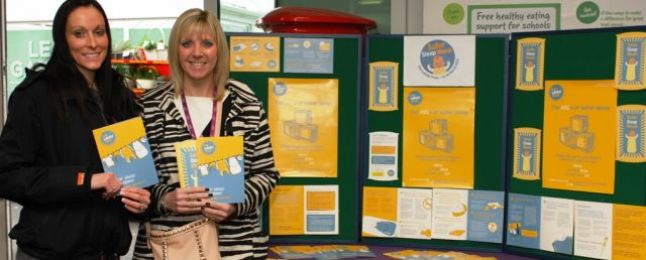
Monday 16 March 2015. Two health visitors from CSH Surrey, Caroline Berryman and Jane Clark, manned a stand at Asda in Burgh Heath from 10am until 3pm on 16th March in support of the Lullaby Trust's Safer Sleep Week. They spoke with parents of young babies, offering them advice on how to avoid Sudden Infant Death Syndrome (SIDS) by following a few simple tips:
- Always place your baby on its back to sleep, not on their front or side (unless advised by a doctor for medical reasons). Sleeping a baby on its front or side greatly increases the risk of SIDS, especially if the baby usually sleeps on its back as part of its regular sleep routine. If your baby rolls onto its tummy, you should turn them onto their back again. Once your baby can roll from back to front and back again on their own, they can be left to find their own sleeping position.
- Keep your baby smoke-free during pregnancy and after birth. Smoking during pregnancy and after your baby is born greatly increases the chance of SIDS. You should also try to keep your baby out of areas where other people smoke. You have a much better chance of giving up smoking if you get help to quit - speak to your midwife or health visitor, or call NHS smokefree on 0800 022 4332.
- Breastfeed your baby. Breastfed babies have a lower chance of SIDS, even if you only breastfeed for some of the time. Exclusive breastfeeding lowers the chance of SIDS most.
- Place your baby to sleep in a separate cot or Moses basket in the same room as you for the first six months, even during the day. The safest place for your baby to sleep for the first six months is in the same room as you in a separate cot or Moses basket. The chance of SIDS is lower when you do this.
- Use a firm, flat, waterproof mattress that's in good condition. Avoid using soft or bulky bedding (such as quilts, pillows and duvets) as these increase the risk of SIDS.
The health visitors also shared things that parents with young babies should avoid:
- Never sleep on a sofa or in an armchair with your baby. This greatly increases the risk of SIDS, even in the day. Never sleep with your baby either next to you or on your chest on a sofa or in an armchair.
- Don't sleep in the same bed as your baby if you smoke, drink or take drugs. Bed sharing increases the chance of SIDS and is particularly dangerous if you or your partner smokes (even if only outside), has drunk alcohol or has taken drugs, including medications that may make your drowsy. Bed sharing is also dangerous if your baby was premature (born before 37 weeks) or had a low birth weight (less than 2.5kg or 5.5lbs, even if you don't smoke, drink or take drugs.
- Avoid letting your baby get too hot. The chance of SIDS is higher in babies who get too hot. A safe and comfortable room temperature for babies is 16-20 degrees C,with light bedding or a lightweight well-fitting baby sleep bag. Check whether your baby is too hot by looking for sweating or feel the baby's tummy (your baby's hands and feet will usually be cooler, which is normal). If your baby is hot, remove one or more layers of bedclothes. Babies who are unwell need fewer, not more, bedclothes.
- Don't cover your baby's face or head while sleeping or use loose bedding. Loose bedding can cover your baby's face or head, which can be dangerous and can increase the chance of SIDS. To keep their head uncovered you should:
- Place your baby to sleep so its feet are at the end of the cot - so they can't wriggle down under the bed clothes
- Use blankets that are firmly tucked in, no higher than the baby's shoulders or sleeping bag
- Babies do not need to wear hats indoors.
About Sudden Infant Death Syndrome (SIDS)
SIDS is the sudden and unexpected death of a baby where no cause is found. While SIDS is rare, it can still happen and the steps above will help parents reduce the chance of this tragedy occurring.
For more information, visit the Lullaby Trust website (www.lullabytrust.org.uk) or call 0808 802 6869. The Lullaby Trust promotes expert advice on safer baby sleep and providers specialist support for bereaved families.